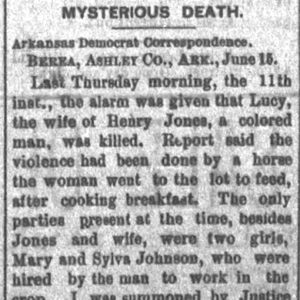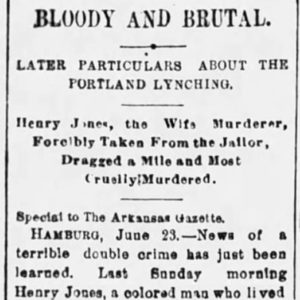calsfoundation@cals.org
Henry Jones (Lynching of)
On June 23, 1891, an African-American man named Henry Jones, accused of murdering his wife, was hanged by a mob near Hamburg (Ashley County).
The victim may have been a thirty-seven-year-old African American named Henry Jones, who in 1880 was twenty-six and living in Ashley County’s De Bastrop Township with his wife, Eliza, age eighteen, and children Jane (age five) and William (age one). Although newspaper accounts indicate that Jones’s wife’s name was Lucy, this may be an error in reporting.
On June 18, the Arkansas Democrat published a report on Jones’s alleged crime. According to the Democrat, Jones told authorities that after cooking breakfast on the morning of June 11, his wife went out to get one of their horses and the horse attacked her. Others present at the time were Jones and two girls, Mary and Sylva Johnson, whom he had hired to work on his crop. Constable W. G. Campbell asked for an inquest, which was held the following day. Apparently, Henry Jones had a history of beating his wife; the Arkansas Gazette reported later that his treatment of his wife had been “severe and cruel.” In any case, the wounds did not appear to be caused by a horse, and the coroner’s verdict was that “the wounds were made by some unknown cause,” and “the suspicion that a crime had been committed was so strong that on the affidavit of two citizens,” Justice Campbell arrested not only Jones, but the Johnson girls as well. Sentiment among local citizens was “very strong” against Jones.
Early on the morning of June 23, a mob of ten or twelve men, both white and African American, went to the jail and forced the jailor to surrender Jones. They dragged him a mile out of town, scraping the skin from parts of his body in the process. They then hanged him from a tree and riddled his body with bullets. According to the Gazette, a subsequent coroner’s inquest found “as usual, that Jones came to his death at the hands of unknown parties.” The Gazette decried this incident, noting that Jones had been “securely confined and well ironed in the County Jail,” and would undoubtedly have been suitably punished for his alleged crime. According to the Gazette, “The good and order-loving citizens condemn this lynching in strong terms,” as events like this “are not only a blow at the material prosperity of this county, but a reproach to its Christian civilization. Swift retribution will inevitably visit the community where such deeds are tolerated, and bring moral death to all its vital interests.”
For additional information:
“Bloody and Brutal.” Arkansas Gazette, June 24, 1891, p. 1.
“Mysterious Death.” Arkansas Democrat, June 18, 1891, p. 3.
Nancy Snell Griffith
Davidson, North Carolina
 Civil Rights and Social Change
Civil Rights and Social Change Post-Reconstruction through the Gilded Age, 1875 through 1900
Post-Reconstruction through the Gilded Age, 1875 through 1900 Ashley County Lynching
Ashley County Lynching  Henry Jones Lynching Article
Henry Jones Lynching Article  Henry Jones Lynching Article
Henry Jones Lynching Article 




Comments
No comments on this entry yet.